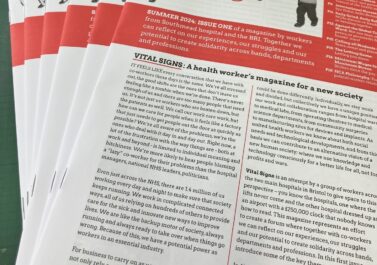
Things are heating up – the 1% pay increase insult dished out by the government led to a lot of angry discussions in tea rooms and on ward floors. This is a proposal to other comrades and workers’ militants in the health sector to exchange their experiences and discuss how to support both self-organised and effective struggle and the expansion of workers’ and patients’ control. Here are some reasons why we think this kind of network is necessary. If you think similarly, please get in touch. We will have an online meeting on the 11th of March 2021.
1. The widespread view that it is ‘our NHS’ prevents us from taking the offensive steps needed to defend our and the patients’ conditions
It is not a coincidence that we see more offensive disputes amongst outsourced health workers than within the NHS. Trade unions, more often than not, are reluctant to rock the boat, while claiming at the same time that the NHS has to be defended as a ‘public good’. While we have to fight for good and free healthcare and against the deterioration of working conditions, we also have to fight the illusion that this will be guaranteed by the formal umbrella of the NHS.
Over the last decades we have seen a slow erosion of conditions for both workers’ and patients. The hierarchies and power relations between management and workers within the NHS are as stark if not starker than those in ‘private’ corporations. Trust managers could always point the finger at the politicians and blame them for the fact that ‘there is no money’ and that’s why health workers often earn less than their fellow workers at Amazon; or that nurses have to pay for their training, while in other countries without a ‘national health service’ they are paid for it. No wonder that a third of nurses don’t finish their studies. Both politicians and management have contained the resistance against all this with the threat of further ‘privatisation’. The trade unions have toed the line, despite the fact that beneath the shell of a ‘public institution’ many services within the NHS are privatised already. But even as a state-owned apparatus, the NHS was never in workers’ and working class patients’ hands.
2. Only self-confident and collectively organised workers can guarantee health and safety during and beyond the pandemic
Since the pandemic started, 850 NHS workers have died of Covid and between August 2020 and February 2021 there were 39,000 cases of patients catching Covid while in hospital,In December 2020, 1 out of 4 people who were hospitalised with Covid caught it in hospital. The public attention is on the lack of personal protective equipment and the trade unions are quick to blame ‘outsourcing’ as one of the reasons for an increase in internal infections, e.g. due to the fact that 1,000 full-time cleaner positions have been cut since 2010. While all of this will have played a role, at the same time there is no quick fix.
The main issue is that workers often don’t question management decisions, due to lack of solidarity and power. On the respiratory ward, where one of us works, management’s decision to put both Covid and non-Covid patients on the same ward was not questioned. The decision to declare the ward Covid-free, while some test results had not come back yet, was not questioned either. Management was not quizzed on why there were daily updated figures for Covid patients at a Trust level, but no such statistics about how many staff got infected. On a bigger scale, it wasn’tt questioned why a nearby Nightingale hospital that was set up to care exclusively for Covid patients remained empty, while the local hospital had to accept a crammed-in mix of patients.
While a lack of collectivity hindered many workers to raise health and safety concerns, other workers in the sector found new forms of coordination during the pandemic. A community midwife we interviewed told us how online forums that are usually only used for ‘professional questions’ became sites where workers discussed which work tasks should be prioritised, how to work safely and how to deal with reluctant or disorganised management. The question of ‘who is in control’ became more concrete.
3. The bigger framework of the NHS is changing, but it is equally important to analyse the day-to-day restructuring in each department and Trust
The left preoccupies itself with the new White Paper about future ‘Integrated Care Systems’, new forms of contractual relationships with and within the NHS, and the government’s current budget revelations government. We agree that it is important to look at the wider framework and tendencies, e.g. it makes a difference if money comes from the state or from private corporations such as Operose Health Ltd. that recently took over a large chain of GP surgeries across London. These changes affect the general conditions for our struggle. But the main conditions for workers are decided in the direct relationship with management on a departmental and Trust level.
Also we see a proliferation of ‘apprenticeships’ within the NHS, and individual Trusts take advantage of the cheap labour (sometimes 25% below the minimum wage) to various degrees. An increasing number of functions and work tasks are delegated to the lower paying wage bands. While wages are fixed within the NHS band system, management at one of the Trusts where we work could offer £300 per month ‘risk bonus’ for people who take on extra shifts on Covid wards. We are critical of such ‘monetarisation of risk’, it just proves that local management can pay if they think they have to. While bank agency staff normally lose money and booked shifts if they call in sick, workers in some Trusts were able to enforce payment for them during the pandemic, in order to avoid them coming in sick or after exposure risk. In other trusts this was not enforced. Certain branches with a string rank-and-file union structure, such as Guys and St.Thomas’ in London were able to enforce particular concessions, such as higher staffing levels. The problem is that these differences and achievements of pressure from below are not communicated more widely.
4. There are many local disputes in the sector, but we don’t have the means and connections to learn from them
This problem of lack of open communication becomes apparent when we look at the current industrial actions in the sector. Here we mainly hear the official versions from the various unions who are involved:
- In April 2020, outsourced ISS cleaners at Lewisham Hospital went on strike for better pay. According to the GMB, they obtained an increase to £10.55 per hour.
- In December 2020, about 50 Serco maintenance staff at the Norfolk and Norwich University Hospital accepted a 4.5% pay increase negotiated by Unite after the threat of strike. At Royal Berkshire hospital, Kingdom Services Group security went on five days industrial action for a £12 an hour pay demand. At Great Ormond Street hospital, domestic workers have fought to be taken back iin-house once the current contract runs out in August 2021 – the UVW threatened strike action.
- In January 2021, porters went on 11 days of strike action organised by Unison against ‘fire and re-hire’ by the NHS Trust at Heartlands in Birmingham. Management wants to impose more flexible shift times.
- In February 2021 at Airedale hospital, AGH Solutions porters and domestics engaged in a dispute for equal pay. GMB said employees of AGH Solutions, a wholly-owned subsidiary of the health Trust, are being paid different rates for doing the same job. The outsourcing happened in 2018, and since then, new starters earn £1 less; according to the bosses the lowest category earn £18,586, which is basically the same as NHS Band 2.
- In March 2021, more than 150 porters, cleaners, switchboard and catering staff employed at Cumberland Infirmary by facilities company Mitie, took a first day of action with Unison over missing payments for working unsocial hours. Mitie workers also took action with the GMB at Epsom & St Helier NHS Trust for unpaid wages.
These disputes affect mainly the outsourced fringe. While conditions ‘inside’ the NHS are not much better, it seems that the unions are more reluctant to combat low wages and irregular shifts on a Trust level. The second problem is that we hear little about the actual strength and weaknesses of these strikes. How does the NHS staff react to them? Do they actually hurt management and how? How does management try to undermine the strike? Part of the problem here is that all unions try to present themselves as victorious, which impedes a critical self-reflection. We have to create worker-focused forums for this task. Even within unions, these strikes are often not communicated, e.g. although one of us is a Unison member they were not informed about the two ongoing disputes in nearby Trusts. There was no attempt to engage in local solidarity activities.
5. Current national pay campaigns are promising, but they remain too distant from our day-to-day power struggles with management
Boosted by the junior doctor dispute and the widespread discontent amongst nurses we see the development of a national pay campaign. While actual rallies and local activities have been made difficult by the pandemic, based on previous experiences with such kind of campaigns we can say that they often remain fairly symbolic. Some of us attended online rallies of the NHS15 campaign together with 60 to 80 other people, but there was very little information about how the wider campaign is supposed to link up to the actual power struggle on the ground. The main proposals were to let fellow workers sign a petition and to hand it to local management.
Then we hear that around certain nuclei, such as stronger union branches in London, bigger groups of nurses are able to congregate and plan certain actions, such as a 3,000 health-worker strong demonstration to parliament. These nuclei and actions are not taken as a starting point, instead the campaign relies too much on online networking of individuals. Overall the campaign remains limited also on a ‘professional level’, focusing on nurses and talking less about the even greater need of healthcare assistants or porters and cleaners for a wage raise. As usual we have the problem that the actual disputes remain locally isolated and divided by unions, while the national pay campaigns remain toothless. Still, there is a fair chance that by participating in these efforts, working class militants in the sector are able to find each other and discuss alternatives, based on both local shop-floor power and wider coordination.
6. There is a lot to learn from health workers abroad, but a parochial view that ‘the NHS is different’ has prevented us from doing so
We have a lot to learn from experiences abroad. It seems that due to the recent focus on ‘national politics’ (Labour party, Brexit) and the ‘national character’ of the health service, the working class left in the UK is more blindfolded than in other countries. For many NHS campaigns, the reference to the bad health system in the US and the ‘threat of take-over of our national treasure’ by foreign investors is the main form of negative internationalism. But nurses in the US especially are everything but defenceless victims of the private health corporations. Unlike in the UK, in the US there were actual large-scale walk-outs during the pandemic against bad health and safety standards, such as most recently at the Albany Medical Centre in New York state or at eleven nursing homes owned by Infinity Healthcare Management in Chicago in December 2020, involving hundreds of nurses. In January 2021 we saw hospital strikes and department occupations at hospitals in Toulouse in France. Workers were protesting at recent failures to replace 12 nurses and management’s demands to work beyond their usual hours without pay. After 24 hours of strike and occupations, workers won on most of their demands. Eight new nurses will be recruited as well as other staff. Any overtime work will be paid and voluntary. In Greece doctors went on strike in February 2021, complaining that intensive care units are at 80% capacity. Thanks to wider political collaboration we have good contacts with healthcare workers abroad, for example friends in Czech Republic were able to participate in a rank-and-file network of several hundred nurses across several hospitals that was able to take industrial action and enforce wage hikes.
7 . We can start with some basic steps
We don’t need to re-invent the wheel, instead we want to create a basic forum of militant health workers to facilitate the following:
- the exchange of experience concerning concrete conditions and concessions won on a departmental or Trust/company level;
- the exchange of reports about the ongoing disputes that look behind the official union announcements;
- the circulation of relevant international news about struggles in the sector, focusing on first-hand reports and direct correspondence that go deeper than the official media;
- the exchange of material that we use in our local situation, official union branch material or independent leaflets and newsletters;
- the creation of leaflets with relevant reports that can be used for local distribution amongst colleagues;
- the discussion about the wider significance of struggles in the health sector for the struggle against the current social order and for a classless society.
This is not meant as an alternative to existing campaigns or organisations, but as a forum of reflection and exchange of militant workers in the sector. If you are interested, please get in touch.
angryworkersworld@gmail.com



